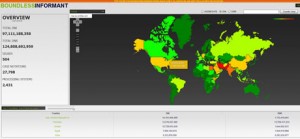Are Guardian’s Sources Responding to a New Use of Surveillance, Post-Boston?
Update: The Guardian source, Edward Snowden, has revealed himself. Stunning.
Little mentioned as we talk about the massive amounts of spying Obama’s Administration undertakes is this passage from the President’s recent speech on counterterrorism.
That’s why, in the years to come, we will have to keep working hard to strike the appropriate balance between our need for security and preserving those freedoms that make us who we are. That means reviewing the authorities of law enforcement, so we can intercept new types of communication, and build in privacy protections to prevent abuse. [my emphasis]
As massive as the surveillance collection currently is, Obama recently called to expand it.
Most people have assumed that’s a reference to FBI’s persistent call for CALEA II, newly proposed to be a law imposing fines on companies that don’t comply with “wiretap” orders.
The F.B.I. director, Robert S. Mueller III, has argued that the bureau’s ability to carry out court-approved eavesdropping on suspects is “going dark” as communications technology evolves, and since 2010 has pushed for a legal mandate requiring companies like Facebook and Google to build into their instant-messaging and other such systems a capacity to comply with wiretap orders. That proposal, however, bogged down amid concerns by other agencies, like the Commerce Department, about quashing Silicon Valley innovation.
While the F.B.I.’s original proposal would have required Internet communications services to each build in a wiretapping capacity, the revised one, which must now be reviewed by the White House, focuses on fining companies that do not comply with wiretap orders. The difference, officials say, means that start-ups with a small number of users would have fewer worries about wiretapping issues unless the companies became popular enough to come to the Justice Department’s attention.
That is certainly at least part of what Obama’s seeking (though the ill-considered plan presents as many security issues as it does privacy ones).
But I note that Mike Rogers said this on ABC this morning.
And so each one of these programs — and I think the Zazi case is so important, because that’s one you can specifically show that this was the key piece that allowed us to stop a bombing in the New York Subway system.
But these programs, that authorized by the court by the way, only focused on non-United States persons overseas, that gets lost in this debate, are pieces of the puzzle. And you have to have all of the pieces of the puzzle to try to put it together. That’s what we found went wrong in 9/11.
And we didn’t have all of the pieces of the puzzle, we found out subsequently, to the Boston bombings, either. And so had we had more pieces of the puzzle you can stop these things before they happen. [my emphasis]
Mike Rogers asserted, with no evidence given, that had we had more information on Tamerlan Tsarnaev, we might have been able to prevent the Boston attack.
Rogers has, in the past, suggested that if we had gotten the texts between Tsarnaev’s mother and a relative in Russia discussing Tamerlan’s interest in fighting jihad. But it’s not clear that anything prevented us from collecting the relative’s communications, and if the discussion of fighting is as obvious as reporting claims (I suspect it is not), there would have been adequate probable cause to ID the mother.
In fact, one of the Guardian’s other scoops makes it clear that we don’t collect all that much SIGINT from Russia in the first place, so the fact we missed the text may say more about our intelligence focus than the technologies available to us.
Nevertheless, Rogers at least suggests that we might have been able to prevent the attack had we had more data.
In part of an interview with Andrea Mitchell that has not yet (AFAIK) been shown, James Clapper whined that the intelligence community was accused of not being intrusive enough following the Boston attack.
DNI Clapper @TodayShow: I find it a little ironic that after the Boston bombings we were accused of not being intrusive enough
Which makes me wonder whether Obama is calling for more than just CALEA II, but has floated using all this data in new ways because two guys were able to conduct a very low-tech attack together.
Glenn Greenwald said somewhere (I haven’t been able to find it) that he had been working on the PRISM story for around 2 months. If so, that would put it close to the Boston attack (though if it were two full months, it’d make it before the attack).
Given that timing, I’m wondering if the final straw that motivated this presumably high level NSA person to start leaking was a proposed new use of all this data hoovered up. Clapper et al insist that the FISA Court does not currently allow the NSA to data mine the data collected in its dragnet.
But have then been thinking about changing that?
